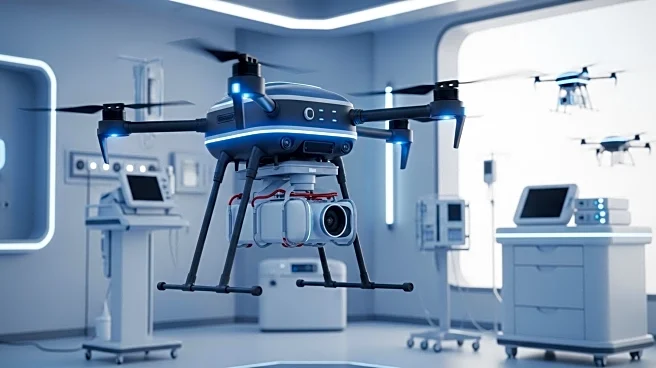What's Happening?
Dispatch, a startup, is set to introduce a new battlefield medical unit called 'The Harbor' at the upcoming AUSA meeting. This unit is designed as a 20-foot shipping container that can be adapted for various types of battlefield care, including immediate damage control and prolonged casualty care. The unit features a hardened exterior to protect against ballistics and can be equipped with anti-drone defensive systems. Dispatch is collaborating with Anduril to integrate telehealth capabilities via Anduril's Lattice mesh network, enhancing the unit's ability to manage electromagnetic signatures and reduce vulnerability to enemy drones. Luke Sciuli, Dispatch's general manager and a former Army medic, has drawn insights from his experiences in Ukraine, where drone warfare and targeted attacks on medical personnel have highlighted the need for advanced frontline medical care. The Harbor aims to address these challenges by providing rapid deployment and modern health monitoring capabilities, significantly improving battlefield medical outcomes.
Why It's Important?
The introduction of The Harbor represents a significant advancement in battlefield medicine, particularly in high-intensity conflict scenarios where traditional medical evacuation methods are compromised. The unit's ability to be set up quickly and its integration of modern information technology, including telehealth and remote monitoring, offer a cost-effective solution compared to traditional field hospitals. This innovation is crucial as it addresses the increasing complexity of warfare, where air superiority is challenged by drone technology, making rapid medical evacuations difficult. The U.S. military, despite its resources, faces potential challenges in future conflicts that could result in higher casualty rates, necessitating more efficient and effective medical solutions on the front lines.
What's Next?
Dispatch plans to produce approximately 300 units of The Harbor in 2026, contingent on securing contracts. The units are designed for mass manufacturing, including edge manufacturing or overseas production, to meet the demands of various deployment contexts. The integration of telehealth and remote monitoring capabilities will continue to evolve, potentially transforming how battlefield medicine is conducted. As the U.S. military and other forces adapt to the changing nature of warfare, The Harbor could become a standard component of military medical operations, enhancing the ability to provide immediate and effective care in combat zones.
Beyond the Headlines
The development of The Harbor highlights the ethical and strategic implications of modern warfare, where medical personnel and facilities are increasingly targeted. The integration of advanced technology into battlefield medicine not only improves medical outcomes but also raises questions about the role of technology in warfare and its impact on humanitarian efforts. As drone warfare becomes more prevalent, the need for innovative solutions like The Harbor underscores the importance of protecting medical personnel and ensuring access to care in conflict zones.











